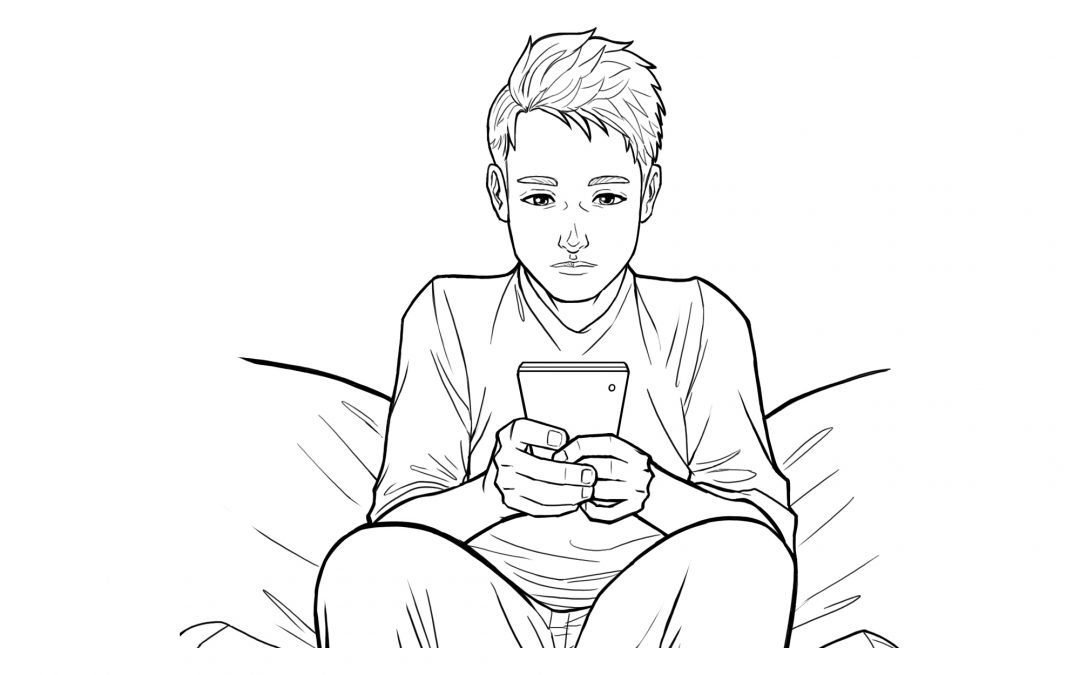There are many ways children can have exposure to porn, even if they are closely supervised, and are being raised by conscientious parents. Here are some of them:
- Your child’s friend or friend’s older sibling exposes your child to porn either at your house, or when they are at his house.
- Your child hears about porn and uses what he’s learned to google it, or goes directly a website he’s been told about.
- Your daughter’s boy friend or boyfriend asks her to watch it with him and she agrees, or he just does it unexpectedly with her.
- A parent has a subscription to porn on their computer, and your child stumbles upon it.
- Your child googles an image for something, and when those images come up there is also a pornographic image, which he clicks on, and then continues further to the originating page, which can lead to a porn site.
- Your child accidentally has a typo in a web address he’s trying to reach, and there’s a porn site that is just a letter off, so that is where he lands (some child porn sites have intentionally done this with the web addresses of popular children’s websites).
There are other ways, but these are the most common. After a few deep breaths, what you do next is critical. Shaming your child in this or other parenting scenarios can lead to negative conditioning which affects your child’s ability to be open and intimate later in life. You will want to use acknowledging and validating even if you have strong emotions about what has happened. You can read the how-to on acknowledging and validating for any situation, and here’s how it would look for this specific case. It’s important to know that by using this method, you achieve a few key things as a parent:
- You keep communication open. You are directing energy toward your child when you have the courage to have difficult conversations. In the same way you would put effort and energy into a difficult conversation you might need to have with a spouse, friend, co-worker, or boss, you put the same conscientious effort into preparing for this potentially difficult or uncomfortable conversation with your child. Your child, on some level now, and especially later in life, will recognize this energy. It speaks volumes about your commitment to parenting and is a very strong love language. It increases the chances that your child will come to you in the future when he needs guidance, and that he will open up when you approach him. Additionally, he will see you as an approachable parent.
- You remove shame. Acknowledging and validating, and the Courageous Conversation, when done properly, leave your child in-tact. A child doesn’t come away feeling like he or she has been lectured, put down, shamed, humiliated, or shut out. Your child feels whole, complete, and perfect, greater in all ways, and in all ways, than they think they are.
- You remind them once again that you expect greatness out of them. You believe in them. You’re never going to give up on them. And you’re always going to help them–even when they make poor or questionable decisions.
- You have been your best self, the best parent you can be, in this moment. You took your one chance, and made the most it. This leads to more excellent parenting.
- You do not over-react, or even create a false over-reaction to prove a point. You stay present and calm. You show your child it is safe for them to learn and grow as your child.
So, here’s the Courageous Conversation, and the acknowledge and validate, tailored for a child who has viewed once or twice, or is consistently viewing porn. The assumption is that this is the first time you have learned about this, even if it has been more than a one-time experience for your child. As always, the language and context can be adjusted to meet the scenario, this is general language that can be used. Want me to have this conversation with your child, or want further support with it? Contact Cara Day.
- Before beginning, take a cleansing breath and quietly center yourself. If you would like, say the affirmation, “May I be the space for this.” This will help you step into a place of non-judgment and openness. Clear your mind.
- Let your child know you would like to have a “Courageous Conversation.” This is code for “a discussion that needs to happen that might be uncomfortable on one or both sides.” By letting your child know in advance that it is a Courageous Conversation, he will come with an openness, especially if you have successfully used Courageous Conversations in the past. The purpose of a Courageous Conversation is to come to a new level of awareness and understanding of one another. It should be understood that the purpose is always to bring the people in your family closer together, not prove people right or wrong, or saying, “I told you so.” If you do not have a pure intention, spend time alone in meditation or prayer until you are ready to have a powerful, constructive dialog. Then, make a time and space where you will be uninterrupted and have no time constraint. If there is a time constraint, make everyone aware of it at the beginning, or have the Courageous Conversation at another time.
- Re-center yourself as often as needed during the Courageous Conversation. You can do this by taking a cleansing breath and silently saying an affirmation, such as, “There’s room for this, too.” or “I can be the space for this,” or whatever feels right for you.
- Describe what has happened from your perspective. In the most objective way, and with a calm, even voice let your child know what you have discovered, and any other details relevant to the situation. “I saw your history on the computer, and I know that even though I had asked you not to go on the computer when your friend so-and-so was over the other day when I was at the store, you chose to do that and you were viewing porn.” If you had previously discussed porn, you can remind your child of that discussion and what had been said at that time. If you have never discussed it before, say, “I’d like to talk about porn with you because I love and care about you, and it’s something that it is important for us to have a mutual understanding around, for your benefit.”
- At this point, I would dig a little deeper about the porn viewing. I’d ask calm, open-ended questions along these lines:
Say, “In order to help us talk about this, I’d like to know…”
- How often have you looked at porn?
- Where have you done this?
- Who have you done this with?
- How did the situation come about?
- Is there anything else you want to share with me about this right now?
It is incredibly important that anytime your child is sharing with you about things relating to sex and other potentially difficult-to-discuss issues, that you are calm and un-reactive. Use a slower, loving voice. Even if you are cringing, screaming, or jumping up and down on the inside, it is critical that you keep yourself outwardly receptive and stay focused on your bigger objective. Acknowledge your child and continue with calm, open-ended questions. Often times when kids are reluctant to share in my coaching practice, I will say, “It’s unlikely you could share something with me that would surprise me or that I haven’t experienced myself. Be gentle with yourself. You are safe to share.”
One time, a client had had a same sex touching incident over which he was incredibly embarrassed and ashamed. He reached out to talk to me, yet during the session, still did not want to share. After a few minutes of trust-building, he did. He had been carrying mental anguish about it for over a year. Once I was able to share the statistics with him about how normal and common it is for teenagers to have these experiences (over 65 percent of the population experiences some kind of consensual same sex touching between the ages of 8 and 25), he was able to begin to release his guilt and shame. We generated a list of reasons it might have been a good thing that it happened, and we talked through his emotions about the experience, as well as ways he can stay self-aware so he can best create an authentic life as he matures into adulthood. He had also created self-imposed fears around people finding out, his parents knowing and no longer loving him, and other fears relating to the potential of being socially ostracized, since he was a popular and well-liked fifteen-year-old boy. None of these things were real or present in his life, yet they haunted his mind and he had been carrying it at a very subtle level. We talked through the reality of each of these situations, and he was able, one by one, to realize that none of his greatest fears had or would come to fruition, even if someone did find out. We tested his fears against reality, and none of them held up. He was free.
After you have built trust and dug a little deeper to get the information needed proceed, do so as follows.
- Acknowledge and validate what your child has shared. You can say, “Thank you for sharing that with me. I know it can take a lot of courage to talk about these things and I want you to know I recognize the courage you are showing right now.” Below are some phrases for acknowledging your child after they share a piece of information and especially after they share their emotions.
Acknowledge
I’m hearing you say…
So, what you’re saying is…
So, when you ________, ________ happens?
Let me see if I get this…
What you’re telling me is that…
Let me give that back to you to make sure I got it…
In other words…
Let me share what I heard and you can tell me where I’m wrong…
After you acknowledge your child, it’s equally important to validate their feelings. Validation of feelings in no way condones behavior, and it does not place any judgment on feelings or behavior. It simply lets your child know that the way they feel or behaved is understandable given their values or the situation as it was. There’s a common desire to feel “normal,” regardless of what we are experiencing in life. When teenagers are validated, they share more. They feel more whole. They remain open and emotionally alive. When you validate your child, you become an approachable parent. You teach your child they are safe to learn and grow with you as their guide. Validation sounds like this:
Validate
It is understandable that you feel that way…
No one could blame you for feeling…
I can see that you feel _________ and that makes sense…
That’s perfectly normal. It can be very upsetting when something like that happens.
Based on your values (or beliefs, or the way you saw that), it’s no wonder that you feel that way.
It’s ok to feel that way. Just feel it and don’t judge yourself.
So, in this specific scenario, here are some possible AV examples:
Acknowledge: Parent: I’m hearing you say your friend thought of the idea to look at the porn, and you went along, did I get that right?”
Child: “Yes, that’s right.”
Validate: Parent: It’s understandable that you might want to go along with your friend in that situation.
Acknowledge: Parent: It sounds like you guys had heard about this and knew that I would be gone, and took that chance to do it. Did I hear that right?
Child: Yes, that’s what we thought.
Validate: Parent: I can see that you picked a time when I would be gone, and that makes sense for what you wanted to do.
You can see that there is no judgment, and no problem-solving at this time.
- After you have acknowledged and validated your child, based on the details he has shared so far, it is your chance to talk about your feelings about pornography, and in particular about your child viewing porn. Of course everyone has their own views about pornography, and these are very personal. The scenario below will contain my personal beliefs on this subject, ready for adjustment based on your values. The specifics are less important than the overall message and the lasting effect your delivery of the message will have on your child, as well as their future views on not only porn, but also sex, intimacy, and other related topics.
This is what I would say:
“I’d like to share some information with you about pornography that will help you make good choices around it going forward. I’m also going to set some boundaries and rules around looking at porn, so I want you to know that now. But first, I want to say that it is completely normal for you to be curious about your body, about other people’s bodies, and about sex. Most teenagers are pretty curious about sex at some point, so that’s completely normal. Your body is changing and growing, you might be having a lot of different feelings and thoughts, and it can be both exciting and confusing to grow up into an adult. I want you to know that any feelings you have are ok, that’s important. I felt the same way! It’s also normal to be curious about something like porn, which is now easy to view on a computer. It can also seem exciting because you know it is something that you probably shouldn’t be doing. It’s understandable to me that you or any teenager could become curious about seeing porn.
What did you hear me say just now?
Let your child say back what stood out for them. Make any needed clarifications based on what they said back to you. You can check in more frequently to check for understanding, if that is helpful to you.
Great. Now, I’d also like to share some things with you about porn that you may not know. Even though some people look at porn and perhaps do not have any negative impacts from it in their lives, many people who look at porn do. Sometimes when people are adults, or when they are married, they use porn to excite themselves sexually, and they feel this helps them to have a better sex with their partner. And this may be true for some people. Yet, often times, porn can become addictive for someone, and they may find they are watching it more than they think they should, and can actually have a difficult time resisting the urge to watch it. Scientists have studied it a lot at this point. You can imagine that if you were married or in a relationship and you were watching porn instead of spending time with your partner, that eventually that would hurt your relationship, and could even end your marriage or relationship. Porn sometimes causes sex to become primarily a solo relationship. Instead of getting closer and more connected to their partner, the person becomes more and more disconnected, having “sex” alone with porn. It also increases premature ejaculation in men, which is not fun for anyone when you’re doing the real thing. Or, it could cause them to want to seek out a different partner, or more exciting sex outside the marriage or relationship. This would be an example of when watching porn would cause something very negative to happen in your life. That would be a painful reason to have a divorce, especially if you had children.
What are your thoughts about what I just shared? Let your child share any response they may have, then continue:
Another aspect of porn that is important for you to consider is how pornography is made. Often times the girls and boys in pornographic movies are very young and even those that are older are often taken advantage of in various ways. Some of the people are raped by producers, given drugs to ease their anxiety about making the movies, don’t get the money they were promised, and a whole bunch of other terrible things. People who make pornographic movies are trying to make money from their movies. Sometimes, the way the movie is made is illegal, and the people making it could be put in jail if they were caught. So, if you are watching porn, in a way you are helping those people keep doing what they are doing by supporting their business. Even if you are not paying for the porn, someone is.
What do you think about that?
Another thing to consider is that just like any movie you might watch, watching porn might cause you to create unrealistic expectations about your body, another person’s body, and about sex. Intimacy, which means truly knowing someone and caring for them exactly as they are, is not part of pornography, yet intimacy is one of the best things about having sex when you become an adult. People who watch porn regularly often have skewed views of both intimacy, sex, as well as their own body, and their partner’s bodies. In order for you to attract a good partner and maintain loving, healthy relationships, you will want to have healthy views and expectations around these things.
What do you think about what I just shared?
Pornography is also something that is often involved with crimes, especially crimes against women and children, such as rape and child sexual assault. Often, the people who commit those crimes watch porn regularly, and especially before the crime to increase its intensity and to help them follow through with their intended crime. While most people who watch porn are not criminals, most criminals who commit sex crimes watch porn, so it’s a contributing factor.
What do you think about that?
When you get older, you can use this information to decide if watching porn is something you will choose to do as an adult.
But right now, when you are a child living with me, and I am responsible for you, watching porn is something that I am saying you may not do. It will be my expectation that you will not watch it on any computer, or in any other way, even if you are at a friend’s, or anywhere else. If your friend suggests it, I expect leadership from you, and that you will say it is not a good idea, and that you will not participate. Of course, you can choose to find a way to do it without me knowing. If you do that, you will be out of integrity—not just with me, but, more importantly, with yourself. We both know how being out of integrity can affect a person’s life. Since I want you to have every door open to you and a keen sense of inner peace as it relates to your personal integrity, I hope you make the choice that honors our discussion. As you know, I am always open to talk with you about this or anything else, and hope that you will share your feelings about it with me. Just because I am setting this rule and boundary does not mean we cannot discuss the subject or your feelings further, and I may occasionally check in with you about it in the future. How do you feel about what I’ve just shared?”
Hopefully, your child feels safe enough with you to respond to your open-ended questions throughout, so it feels more like a discussion than a lecture. Kids check out when parents start to lecture, so your demeanor and tone of voice are critical in a talk like this. They will hear your overall message loud and clear. Regardless of your specific beliefs, my main recommendation is to be sure your message is shame-free. If you shame your child sexually, you create barriers to later intimacy for them in their adult lives. It’s important that you are relaxed, matter-of-fact, and face-to-face with your child. As with any important conversation, your cell phone should not only be turned off, but completely out of your child’s sight.
Maintain eye contact and be ready to acknowledge and validate any ideas or feelings your child may share during the discussion. Again, the specifics of the discussion can be adjusted to fit your beliefs and boundaries, whether they are more conservative, or more liberal than mine. The purpose here is not a moral debate about pornography, but rather maintaining a connected relationship with your child based on legitimate authority while they are living in your home.
Here is another example of acknowledging and validating:
Acknowledge: Parent: “I’m hearing you say that you were curious about porn and wanted to check out the sites you had read about. Does that sound right?”
Child: “Yes, that’s it.”
Validate: Parent: “It’s normal to be curious about things that relate to our bodies, and especially about sexual things. It’s not surprising to me that you would be curious about that.”
Acknowledge: Parent: “It sounds like you understand that porn can become addictive even to someone who does not set out with that intention. Did I hear you right?”
Child: “Yes, I understand that.”
Validate: Parent: “It doesn’t surprise me that you understand it, since you have heard and learned about other behaviors and substances that can become addictive, such as those that relate to alcohol and drug use.”
This discussion can be the springboard to many other wonderful discussions you could have with your child about sex in general, any sexual experiences they may have had, as well as issues relating to sexuality, both theirs and that of other people.
How you hold yourself in conversations like these will determine how much information your child will share with you. Some parents may not want to have this open or close of a relationship with their child, either because they did not have it with their own parents, or because they do not feel it is their role. Personally, this is something I have always wanted, that I have proactively cultivated, and cherish with my children. With the ready availability of information and images on the internet, I have always wanted to be the sounding board and ultimate source of reliable information for my children. They have each shared things and asked questions that have made my heart skip a momentary beat! Yet, the joy that follows when I realize they trust me to hold their well-being as my number one priority, in a state of non-judgment, it is well worth any temporary uncomfortableness that may occasionally arise. The lively conversations we enjoy now are fascinating. Often, I am not giving an opinion, but rather asking a series of empowering questions that lead them down a path of personal inquiry which helps them make their own healthy deductions. Other times, they say, “Mom, just tell me what to do!” when I start coaching them. Ultimately, effective parenting is not solely about teaching and showing. As children get older, it is more about planting seeds while helping them look within to find their own integrity, truth, and authenticity.







